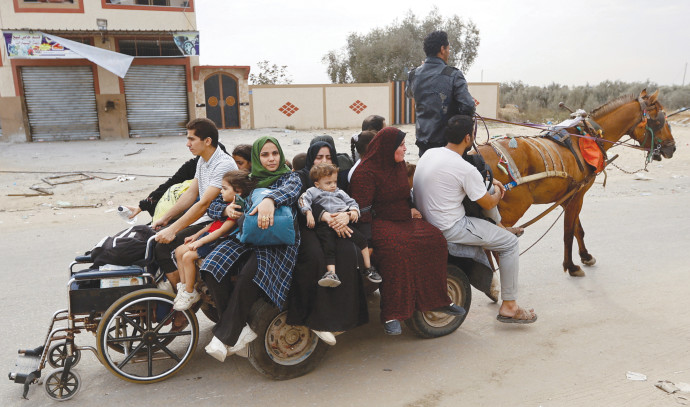M. is a writer from Gaza. He spoke to The Jerusalem Post from his current location in the southern Gaza Strip, alongside hundreds of thousands of other displaced Gazans.
What is the current situation in Rafah?
“The current situation in Rafah is relatively calm, but people are also anticipating the start of the battle in Rafah, with civilians fearing yet another displacement mechanism from the Israeli army,” M. said. “The displaced suffer daily, mainly psychologically, due to the length of the war, but secondly, due to financial weakness, the lack of sources of income and the lack of purchasing power due to the exorbitant rise in prices.”
M. holds that the high prices are not due to a lack of goods. “The Rafah crossing is operating well, and aid enters in a very large amount, and there is never a shortage. However, the distribution of aid is in the hands of Hamas, which means it does not reach all the displaced people."
“There is certainly a general dissatisfaction on the part of the displaced people, and they are calling against Hamas and Sinwar in particular,” he added, referring to videos of sporadic demonstrations in Rafah featuring calls against Hamas leaders. “We are all eagerly awaiting relief soon with our return to the northern Gaza Strip,” M. concluded.
How do you see the prospects that brought us to this situation, and what would be a possible solution in your view?
“The people of Gaza were surprised by Hamas’s move on October 7, which was preceded by general economic and political paralysis due to the narrow political horizons in Gaza,” explained M.
“There is no immediate solution due to Hamas's intransigence in handing over the [Israeli] hostages, except under impossible conditions which they believe will help them to remain in power. There is no solution except by entering Rafah and pressing the fighting until there is great pressure on Hamas.
“Many Gazans hope that Israel will end the war and eliminate Hamas quickly. They reject the 'resistance' and will not accept Hamas again in power,” he added.
You mentioned that many in Gaza oppose Hamas. What would you say to Israelis who witnessed ordinary Gazan civilians who celebrated October 7th and even helped keep hostages in their homes?
“I say to the Israelis that the joy of the people of Gaza was a temporary joy stemming from ignorance and that they regretted it soon after they suffered from the war. As for those who participated in the operation, whether Hamas members or civilians, they were deceived by Hamas, and their members did not even know about the nature of the mission until a limited time before. Some of them even declined participation for fear of death.”
And what about the recent polls showing an increased support for Hamas and the October 7th attack?
“Polls issued by pro-Hamas news sites do not represent the true voice of the Palestinian people, as most of those who vote support Hamas'" he explained. And indeed, the Palestinian Center for Policy and Survey Research is headed by Khalil Shikaki, brother of Islamic Jihad founder and leader, Fathi Shikaki. "Such polls must be issued by an independent party to show the extent of the people’s opposition to the October 7 incident,” he added.
So are we going to see more pressure on Hamas from Gazan civilians?
“The people of Gaza cannot put pressure on Hamas because of the severe force of repression which Hamas applies against the people due to previous experiences during the popular movements, and this makes the issue very difficult,” explained M.
“The lack of opposition voices inside and outside Gaza is due to a large portion of people being influenced by the issue of resistance on a religious and national side without a cultural background, and also their inability to express their opinion for fear of harm.”
As for the media coverage within the Gaza Strip, which emphasizes support for Hamas, M. added: “The Arab media is not very interested in covering the Gaza war, and what they're actually interested in is [agendas of] Al Jazeera and elements of the Muslim Brotherhood in Turkey, Qatar and Jordan in particular.”
Do you not fear for your life by being so openly critical of Hamas?
“I am exposed to a very great risk to my life due to open criticism on social media against Hamas, but Hamas’s governance is weaker now, so I move within this limited margin. Still, I am waiting for my time to travel to Egypt. I wouldn't mind even being a temporary prisoner in Israel to secure my life. I hold Hamas responsible for harming me and Israel for unintentionally targeting me, even though I know that they are taking humanitarian steps in the war.”
What would be your message to our readers?
“My message to Jerusalem Post readers in Israel and abroad is that the Palestinian people do not bear the great guilt in the October 7 operation, that Gaza lives under dictatorial rule by Hamas, and that Israel has a major role in saving Gaza from Hamas in the near future, and we hope that peace will prevail between the Palestinians and the Israelis and that the time of terrorism will end. The people of Gaza do not want to repeat the experience of October 7th and only want to live in permanent safety with Israel.”

